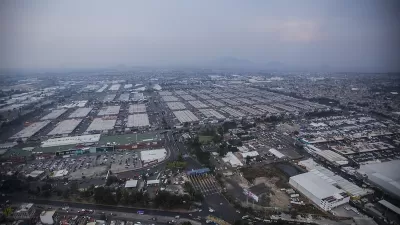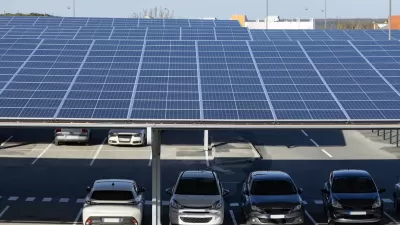Diane Cardwell reports on the creative ways in which solar installers are taking advantage of government subsidies, creative financing, and cheap Chinese-made panels to make solar power accessible to the mass market.
With the number of residential and commercial solar installations more than doubling over the last two years, it seems as though solar power installation companies have found the right blend of economics and marketing to beging to penetrate the mass market. While the manufacturing side of the industry in the United States has struggled, due mainly to competition from Chinese firms, "Major players in the installation business, like SolarCity, Sunrun and Sungevity, are thriving," writes Cardwell.
"The structure of the deals varies by company and state, but the overall
approach is generally the same: Customers agree to pay a fixed monthly
charge or rate for all the solar power produced, and the companies that
finance the systems pay for the installation and take the value of any
tax breaks or renewable energy credits for which the customer would
ordinarily be eligible. Some companies concentrate on financing and use
local contractors for sales and installation, while others do everything
themselves."
"Through such arrangements, industry executives say, customers can lower
their power bills, escape the uncertainty of fluctuating energy costs,
and avoid the complex bureaucracy of federal and local credits, rebates,
grants and tax breaks."

Alabama: Trump Terminates Settlements for Black Communities Harmed By Raw Sewage
Trump deemed the landmark civil rights agreement “illegal DEI and environmental justice policy.”

Planetizen Federal Action Tracker
A weekly monitor of how Trump’s orders and actions are impacting planners and planning in America.

How Atlanta Built 7,000 Housing Units in 3 Years
The city’s comprehensive, neighborhood-focused housing strategy focuses on identifying properties and land that can be repurposed for housing and encouraging development in underserved neighborhoods.

In Both Crashes and Crime, Public Transportation is Far Safer than Driving
Contrary to popular assumptions, public transportation has far lower crash and crime rates than automobile travel. For safer communities, improve and encourage transit travel.

Report: Zoning Reforms Should Complement Nashville’s Ambitious Transit Plan
Without reform, restrictive zoning codes will limit the impact of the city’s planned transit expansion and could exclude some of the residents who depend on transit the most.

Judge Orders Release of Frozen IRA, IIJA Funding
The decision is a victory for environmental groups who charged that freezing funds for critical infrastructure and disaster response programs caused “real and irreparable harm” to communities.
Urban Design for Planners 1: Software Tools
This six-course series explores essential urban design concepts using open source software and equips planners with the tools they need to participate fully in the urban design process.
Planning for Universal Design
Learn the tools for implementing Universal Design in planning regulations.
Jessamine County Fiscal Court
Caltrans
Institute for Housing and Urban Development Studies (IHS)
City of Grandview
Harvard GSD Executive Education
Toledo-Lucas County Plan Commissions
Salt Lake City
NYU Wagner Graduate School of Public Service





























